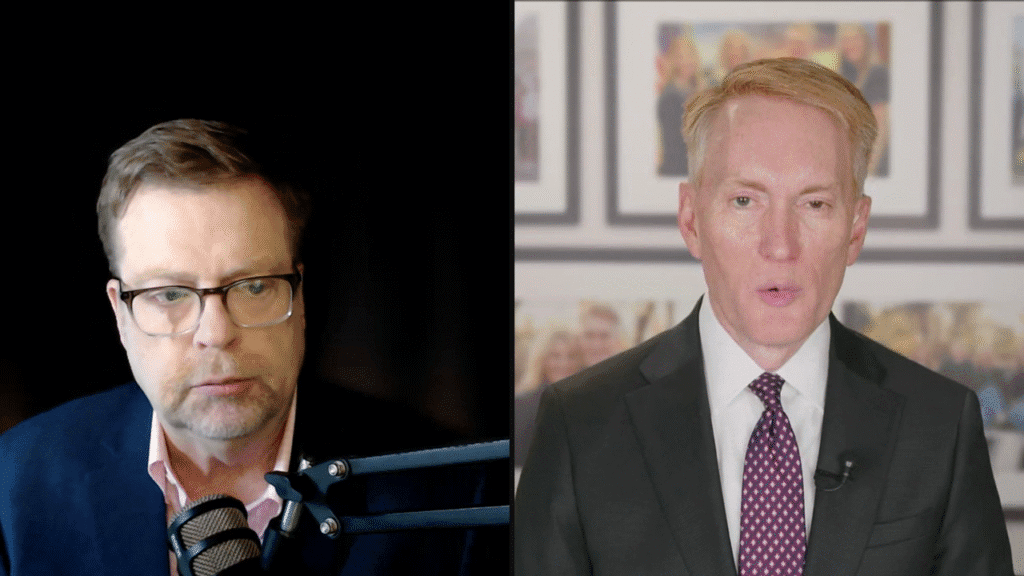U.S. Sen. James Lankford sat down with political analyst Scott Mitchell to discuss national security, online safety, cancel culture, government spending, and Oklahoma’s role in military defense.
Why is TikTok such a national security concern, and what is Congress doing about it?
Lankford said TikTok is a security risk for the U.S. and is pushing away “basic American values.” He explained the app’s parent company, ByteDance, is owned by the Chinese Communist Party.
“All the data from TikTok is directly transferred to the Chinese Communist Party,” he said. “They get unlimited access to that information, that’s all the numbers and access, contacts, everything else that’s connected with TikTok and that anyone gives to it.”
He said the Chinese version of TikTok focuses on education and national pride, while the American version encourages distractions. “The Chinese are definitely using it to try to adjust American society in a younger generation,” he said.
Lankford is one of the lawmakers pushing for TikTok to be sold to an American company. “You could still do that, but the Chinese Communist Party wouldn’t have access to all that data,” he said. “We have plenty of smart people in the United States that can run the systems on this.”
On the heels of the assassination of Charlie Kirk, Lankford said a broader conversation is also needed about how algorithms push users toward conspiracy theories and harmful content.
Could repealing Section 230 change what becomes popular on social media?
Section 230 is part of the Communications Decency Act and shields social media companies from liability for what their users post. Lankford said it needs to be repealed and replaced to reflect how platforms operate today.
“Section 230 was set up during a time period where Facebook was all about sharing pictures of your family and baby pictures and your food. That’s not the main focus of Facebook anymore,” he said.
According to Lankford, companies are no longer just hosting conversations but actively directing them toward rage and controversy to generate clicks and revenue.
What is Congress doing to protect children online?
Lankford said the Kids Online Safety Act has wide bipartisan support and is moving through committees. The bill would set age restrictions for what children can access online.
“We have limitations on cigarettes. We have limitations on alcohol. Why do we have unlimited access to pornography? Why do we have unlimited access to a lot of this quote-unquote adult content?” Lankford said.
He also pointed to a separate bill passed this year that criminalizes the nonconsensual release of intimate images, often called revenge porn, and extends penalties to AI-generated sexual images.
“That is going across state lines,” he said. “That is a federal offense now to be able to actually do those.”
Is cancel culture still shaping media and business?
In recent weeks, high-profile figures have faced repercussions for controversial comments, including Jimmy Kimmel and Fox News host Brian Kilmeade. Lankford said this reflects a broader culture of unforgiveness.
“We are still in a cancel culture mode where we are unforgiving,” he said. “But we’re unforgiving of other people if they say some dumb thing that they made a statement on in their emotion.”
He said companies also face tough decisions when employees post controversial opinions online. “If they’re insulting people online and it hurts the reputation of the company, they’re free to be able to release him as well,” he said.
On Kimmel specifically, Lankford said, “His ratings have gone down. I think this was just a moment for ABC and for Disney to make a decision to say, ‘We’re going to cut him loose.’” He added that Kimmel was promoting a false conspiracy theory about Kirk’s assassination, which likely contributed to backlash against the network.
Why is a government shutdown looming?
The U.S. is two weeks away from a potential government shutdown after a short-term Republican funding measure stumbled in the Senate. Lankford said the sticking point is whether to make expanded Affordable Care Act subsidies, first added during COVID, permanent.
According to Lankford, doing so would cost $300 billion. “So we’re not going to just extend that to have seven weeks of the government stay open,” he said.
He added that subsidies now cover families earning up to 600% of the federal poverty line, doubling the number of people enrolled compared to the start of the Biden administration. Lankford said the system has invited waste and fraud, with some people signed up for insurance they don’t even realize they have.
“So grown-up conversations would help us in this moment,” he said. “It’s unreasonable to say we’re just going to do $300 billion into a program that’s COVID-era, that we know has problems and fraud in, and ignore the reality.”
What does the National Defense Authorization Act mean for Oklahoma?
Lankford discussed Oklahoma’s role in national defense. He said progress is being made on the National Defense Authorization Act, which sets military priorities and funding.
Locally, he is pushing for the replacement of Tinker Air Force Base’s aging AWACS aircraft with the E-7 Wedgetail, a key command-and-control platform.
“There’s been a lot of argument about how do we actually do that? What’s the pacing? What’s the process? Boeing has been behind in the project. That hasn’t made it easier,” he said. “But I’ve been fighting specifically for it.”
He said his final amendment to the defense package is focused on the Wedgetail and ensuring it moves forward. “It is an essential piece for the warfighter to be able to know they’ve got good command and control and good eyes on the battlespace,” Lankford said.

